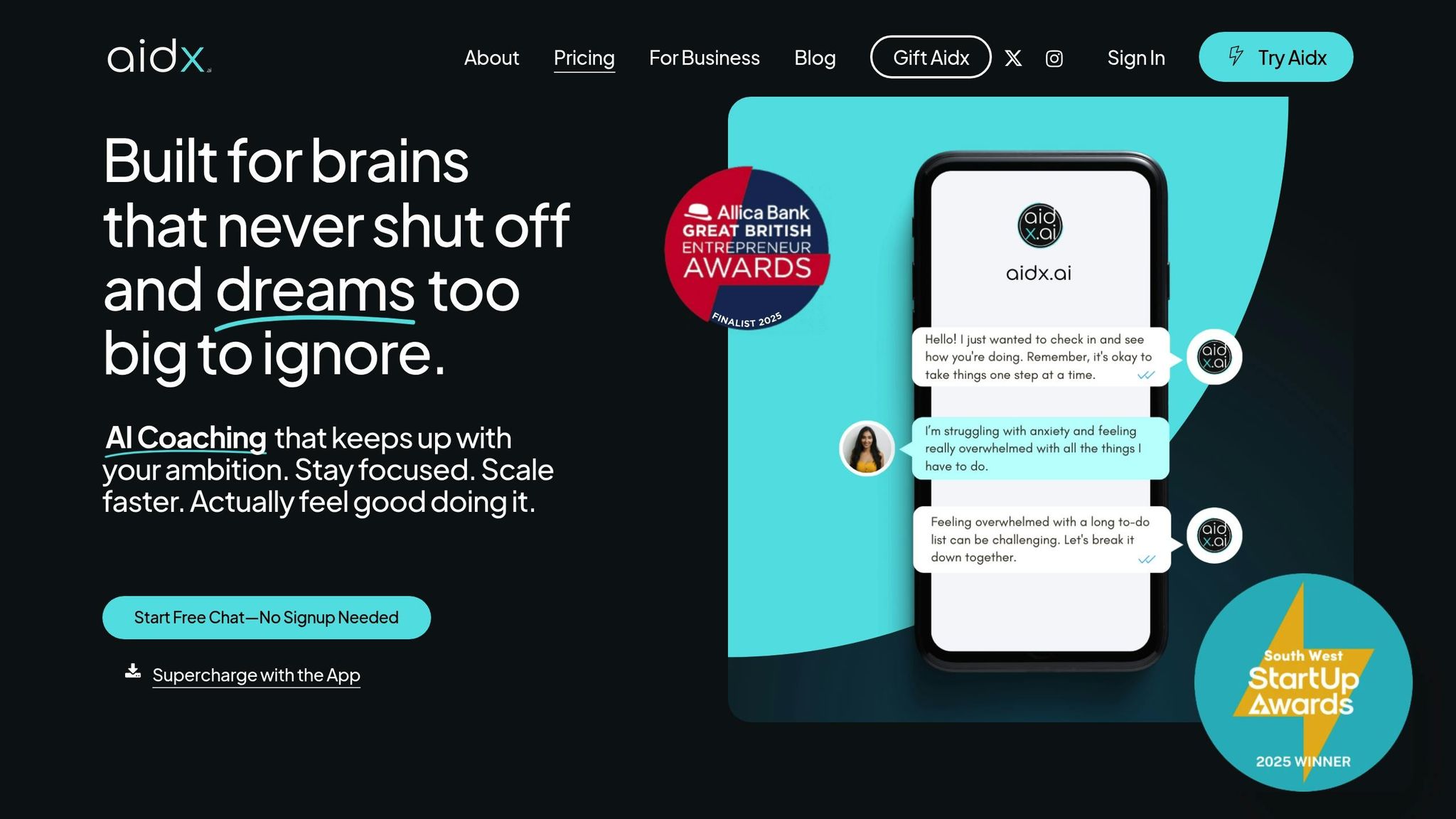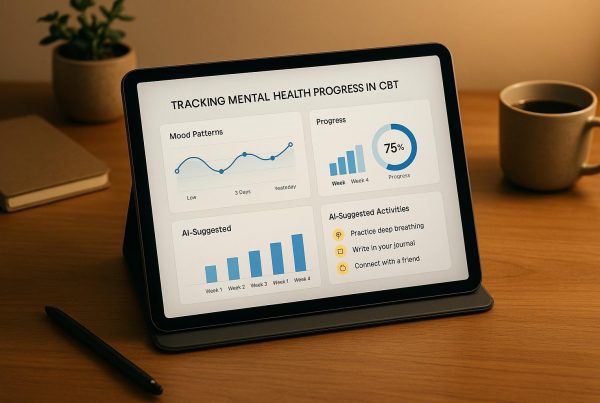AI is reshaping how leaders address mental health in the workplace by providing accessible, personalized, and data-driven tools. Traditional approaches to mental health training often fall short, with 70% of senior employees lacking proper training to support their teams. This gap impacts both employee well-being and business performance, costing U.S. organizations billions annually in lost productivity and healthcare expenses.
AI-powered solutions like Aidx.ai offer real-time support, tailored guidance, and measurable progress tracking, helping leaders manage stress, improve communication, and better support their teams. With features such as voice-enabled coaching, private sessions, and actionable recommendations, AI ensures leaders are equipped to handle mental health challenges effectively. However, it’s essential to balance AI with human expertise to maintain empathy and trust.
Key Takeaways:
- 69% of employees say managers impact their mental health as much as partners or doctors.
- $210.5 billion is lost annually in the U.S. due to unresolved depression.
- AI tools like Aidx provide 24/7 support, personalized training, and cost-effective solutions.
- Combining AI with human practitioners ensures deeper emotional understanding and effective intervention.
By integrating AI into leadership training, organizations can improve workplace well-being, reduce turnover, and boost productivity while addressing the growing demand for mental health support.
AI is Training Therapists Before They Meet Real Patients
Key Benefits of AI-Powered Mental Health Training for Leaders
AI-powered mental health training provides leaders with essential tools to better support their teams. By offering continuous, tailored support, it adapts to the unique challenges and learning styles of each individual leader.
24/7 Access and On-Demand Support
One standout advantage of AI-powered training is its round-the-clock availability. Leaders often face high-pressure situations outside of regular business hours – whether it’s a late-night deadline, a weekend crisis, or an early morning challenge. Unlike traditional training sessions that require scheduling, AI delivers immediate support whenever and wherever it’s needed, offering practical strategies in real time [2].
This constant accessibility allows managers to receive coaching on critical skills like communication, stress management, and team support exactly when they’re navigating difficult scenarios. The result? A training experience tailored to meet the demands of each leader’s unique circumstances.
Personalized, Evidence-Based Training
What sets AI apart is its ability to provide training that’s not only personalized but also grounded in proven methods. By analyzing an individual leader’s behaviors, management style, team dynamics, and stress triggers, AI creates a learning experience that addresses their specific needs. These systems also adapt in real time, ensuring that as a leader’s challenges evolve, so do the recommendations [3].
For example, Aidx’s Adaptive Therapeutic Intelligence (ATI) System™ demonstrates how AI can deliver highly customized training. It adjusts its guidance based on the user’s emotional state, goals, and past interactions, creating a dynamic learning environment. This approach helps leaders enhance their decision-making and manage stress more effectively.
Scalable and Cost-Effective Solutions
Traditional training methods often come with hefty costs – trainers, venues, and employee downtime can add up quickly. AI-powered platforms, on the other hand, can serve a large number of employees simultaneously while maintaining a personalized experience. Research highlights that organizations could see annual gains of about $6,565 per employee by reducing presenteeism through the integration of AI tools with human coaching [4].
Blending AI with human support also reduces barriers to accessing employee assistance programs, making them more effective [4]. Long-term data shows that AI mental health tools can boost productivity by 10–15%, lower turnover rates by approximately 28%, and cut mental health claim costs by around $13,200 per employee each year [4]. In fact, some return-on-investment models suggest that every $1 spent on these tools can yield up to $4.60 in returns, offering substantial financial benefits for businesses of all sizes [4].
How Aidx Improves Mental Health Training for Leaders

Aidx takes a modern, technology-driven approach to mental health training, addressing the gaps left by traditional methods. It offers a tailored solution designed specifically for leadership development.
Overview of Aidx’s Adaptive Therapeutic Intelligence System™
The Adaptive Therapeutic Intelligence (ATI) System™ is at the heart of Aidx’s approach. It evaluates a leader’s current skills, career path, and personal goals to deliver targeted training on critical areas like decision-making, communication, negotiation, emotional intelligence, and conflict resolution [5].
What makes the ATI System™ stand out is its ability to adapt in real time. By monitoring a leader’s emotional state, interaction patterns, and progress, it fine-tunes its guidance. For instance, when a manager faces challenging team dynamics, the system might use Cognitive Behavioral Therapy (CBT) techniques to shift negative thought patterns or Dialectical Behavior Therapy (DBT) strategies to improve emotional regulation during stressful moments.
A key feature of the system is its voice-enabled interface, allowing leaders to engage naturally through conversation. This makes training accessible during busy moments – whether commuting, walking, or multitasking. The hands-free design also provides real-time feedback and tracks performance, ensuring the training evolves with the leader’s growth [5].
Specialized Training Modes
To cater to the unique demands of leadership roles, Aidx offers four distinct training modes:
- Microcoaching Mode: Quick, 5-minute sessions that provide actionable advice for managing tough conversations, reducing stress, or enhancing emotional intelligence – perfect for busy executives.
- Embodiment Mode: Helps leaders visualize successful outcomes and build resilience for high-pressure situations.
- Incognito Mode: Offers completely private sessions that delete automatically after 30 minutes, allowing leaders to address sensitive topics without leaving a digital trail.
- Default Mode: Draws on evidence-based techniques from CBT, DBT, Acceptance and Commitment Therapy (ACT), Neuro-Linguistic Programming (NLP), and performance coaching to tackle complex leadership challenges.
These modes ensure that leaders can access the training they need, when and how they need it, without disrupting their schedules.
Progress Tracking and Accountability Features
Aidx bridges the gap between learning and action with features that promote self-awareness and accountability. Its planning and tracking system includes tools for self-monitoring, multi-channel notifications, and integrated goal-setting, helping leaders stay on track and measure progress effectively.
The self-monitoring system allows leaders to track emotional states, confidence, stress, and overall performance. This data-driven approach not only increases self-awareness but also provides tangible evidence of growth over time.
The integrated planning system helps leaders set personalized goals, create reminders, and organize tasks aligned with their mental health and leadership objectives. By addressing daily stressors and communication challenges proactively, leaders can maintain focus and balance.
For organizations, Aidx Corporate offers team wellbeing dashboards that deliver anonymous, aggregated insights into overall team mental health. These dashboards protect individual privacy while giving companies valuable data to improve workplace culture. Research shows that 75% of companies with strong mental health support from managers see higher employee satisfaction – double the rate of those without such support [6].
"Aidx is your team’s in-house AI-powered therapist, performance coach, and HR strategist: the all-in-one tool your people will actually use." – Aidx [6]
With unlimited AI conversations and check-ins, Aidx ensures leaders always have access to support. Features like practitioner support for in-house coaches and Slack workflow integrations create a cohesive system for personal and organizational growth.
How to Implement AI in Leadership Mental Health Training
Integrating AI into leadership mental health training can transform how organizations support their leaders. By leveraging tools like Aidx, companies can enhance their training programs, addressing mental health challenges while fostering organizational growth. Here’s how to make this integration effective.
Adding AI to Existing Leadership Programs
AI works best as a complement to existing leadership training, not as a replacement. Start by evaluating different AI solutions and running pilot programs to find the right fit for your organization [1].
Aidx’s specialized training modes can enhance traditional training programs. For example, the Microcoaching Mode offers quick, 5-minute reinforcement sessions between formal workshops. This voice-enabled feature allows leaders to access training on-the-go, without disrupting their schedules. Additionally, Aidx’s integrated planning system promotes accountability and tracks group progress. Its ability to provide anonymous, aggregated insights through Aidx Corporate helps training coordinators pinpoint common challenges and adjust program content as needed.
It’s also crucial to educate employees on how AI tools work, including their capabilities and limitations. This builds trust and ensures smoother adoption. As the integration progresses, prioritizing privacy and ethical standards is essential to maintaining user confidence.
Maintaining Privacy and Ethical Standards
Privacy and ethics are the backbone of successful AI implementation in mental health training. Catherine Rusch, MSW, Health & Performance Consultant at HUB International, highlights the importance of transparency:
"In addition to being clear about the safety guardrails put in place, it’s important to have a clear AI roadmap and strategy, making sure employees understand the organizations’ policies around it" [7].
Organizations must establish clear data usage policies and conduct regular ethical audits. Aidx complies with HIPAA, GDPR, and encrypted data standards, ensuring data security [1] [9]. Transparency about how the AI system operates, what data it collects, and how it improves training outcomes builds user trust and confidence [7].
Features like Incognito Mode offer additional privacy protection by allowing leaders to discuss sensitive topics in sessions that automatically delete after 30 minutes. This is particularly useful for addressing personal issues or confidential business challenges.
It’s also critical to have protocols in place for escalating serious mental health concerns. For instance, when AI tools detect significant issues, they should provide options to connect employees with licensed mental health professionals. This ensures that AI serves as a supportive tool, not a substitute for professional care.
Margaret Lozovatsky, MD, vice president of digital health innovations at the AMA, underscores the need for proper governance:
"AI is becoming integrated into the way that we deliver care. The technology is moving very, very quickly. It’s moving much faster than we are able to actually implement these tools, so setting up an appropriate governance structure now is more important than it’s ever been because we have never seen such quick rates of adoption" [8].
Once privacy and ethical concerns are addressed, the focus shifts to keeping leaders engaged with these tools over the long term.
Building Long-Term Engagement and Learning
Sustaining engagement with AI-powered mental health training requires continuous effort and leadership involvement. Leaders should actively participate in these programs, demonstrating their commitment to the initiative and encouraging staff buy-in [11]. When executives embrace AI tools, it reduces resistance and inspires confidence across the organization.
Ongoing improvement is key. Organizations should collect employee feedback, monitor engagement, and refine the AI system based on real-world usage. Aidx’s self-monitoring system supports this by tracking emotional states, confidence levels, stress, and performance metrics over time. This data provides concrete evidence of progress and highlights areas for further development.
To keep the program relevant, allocate resources for regular updates and user support. Aidx’s notification ecosystem helps maintain engagement by sending reminders through push notifications, messaging apps, and email. This ensures mental health training stays top-of-mind for busy leaders.
Involving staff in the planning and implementation process also boosts acceptance. Establish feedback loops to gather insights and share success stories. Partnering with HR and other departments can amplify the impact by linking AI training to measurable outcomes like improved productivity, reduced turnover, and better team performance [10].
sbb-itb-d5e73b4
Combining AI and Human Support in Mental Health Training
Effective mental health training for leaders strikes a balance between the efficiency of AI and the emotional depth that only human insight can provide. While AI ensures accessibility and scalability, human practitioners bring the empathy and nuanced understanding that technology alone cannot replicate.
Benefits and Challenges of AI in Mental Health Training
AI-powered mental health training offers a mix of strengths and challenges. Here’s a breakdown of some key aspects:
| Aspect | AI Benefits | AI Challenges |
|---|---|---|
| Accessibility | Always available, offers instant support without scheduling barriers | May struggle with understanding complex workplace dynamics |
| Scalability | Serves large groups simultaneously with standardized, evidence-based methods | Risk of impersonal interactions and potential miscommunications |
| Privacy | Enables anonymous interactions with encrypted data protection | Raises concerns about data security and potential algorithmic bias |
| Cost | Reduces long-term costs and administrative burdens | High upfront development and implementation expenses |
| Consistency | Delivers uniform, evidence-based approaches without variability | Struggles to adapt to individual or cultural differences |
| Data Insights | Tracks progress and provides measurable outcomes | Overemphasis on metrics may overshadow human judgment |
These comparisons highlight the need for transparency and flexibility in AI tools. One major challenge is the lack of clarity in how AI systems generate recommendations. For leaders addressing sensitive mental health issues, understanding the reasoning behind AI suggestions is critical. Regular audits to identify and mitigate biases, along with clear explanations of AI-generated recommendations, are essential. This ensures that AI remains a tool to support – not replace – human expertise.
Creating a Combined Support Model
A hybrid approach that combines the strengths of AI and human expertise offers the most comprehensive solution. AI shines in providing consistent, accessible support, while human practitioners bring empathy, strategic thinking, and the ability to address complex challenges.
For example, Aidx’s Practitioner Mode allows mental health professionals to stay connected with clients between sessions. The AI can manage routine tasks like check-ins and skill reinforcement, enabling practitioners to focus on deeper therapeutic work. This setup ensures AI complements, rather than replaces, human interaction.
Organizations can start by using AI for foundational support, such as basic stress management or coaching. Tools like Aidx’s Incognito Mode let leaders privately explore sensitive topics before transitioning to human-led support for more intricate issues. Establishing clear protocols is crucial – AI should handle initial support, while human practitioners step in for severe mental health concerns or complex interpersonal challenges.
Training programs that improve AI literacy and set realistic expectations can further streamline this integration. By combining AI’s efficiency with human insight, organizations can create mental health training programs that empower leaders to build resilient, supportive teams.
Conclusion: Changing Leadership Training with AI
AI is reshaping how leaders approach mental health training, moving away from generic methods to embrace tailored, accessible, and data-driven solutions. This isn’t just a technological upgrade – it’s a reimagining of leadership development to align with the demands of today’s workplaces.
The numbers back this up. The global AI mental health market hit $1.13 billion in 2023 and is expected to grow by 24% annually from 2024 to 2030[12]. Even more telling, 32% of people worldwide are open to using AI for mental health support, reflecting a growing acceptance of technology as a valuable tool for personal and professional growth[12]. In this shifting landscape, Aidx.ai stands out as a leader in integrating AI into mental health training for leaders.
Aidx.ai’s Adaptive Therapeutic Intelligence (ATI) System™ is a prime example of this transformation. It offers 24/7 voice-enabled support, delivering evidence-based techniques from CBT, DBT, ACT, and NLP. On an organizational level, Aidx Corporate provides anonymous, aggregated insights into team wellbeing, allowing companies to support large leadership teams without incurring high costs or logistical hurdles.
The future of leadership training lies in a hybrid approach. By blending AI’s consistency and accessibility with the empathy and expertise of human practitioners, organizations can create robust support systems. This model addresses both everyday challenges and more complex interpersonal issues, offering immediate AI support alongside human intervention when needed. The result? Leadership training that not only fills existing gaps but also strengthens entire organizations by cultivating leaders who are emotionally intelligent and resilient.
AI-powered mental health training is more than just a trend; it’s a game-changer. It’s making high-quality support widely available and equipping leaders with the tools to thrive in today’s fast-paced, ever-changing work environments.
FAQs
How does AI protect sensitive mental health data during leadership training?
AI protects sensitive mental health data through end-to-end encryption, ensuring that unauthorized parties can’t access or tamper with it. It also adheres to stringent privacy regulations, such as the GDPR, to maintain user confidentiality and safeguard against data breaches. By limiting human intervention, AI ensures data is accessed only when legally mandated, allowing users to retain full control over their personal information.
How does combining AI and human expertise improve mental health training for leaders?
How AI and Human Expertise Transform Mental Health Training for Leaders
Combining AI with human expertise is reshaping how leaders approach mental health training by making it more personalized and accessible. AI tools can offer real-time insights, monitor progress, and suggest tailored strategies. Meanwhile, human expertise brings empathy, depth, and a nuanced understanding to the table. Together, they form a powerful support system that enhances emotional intelligence, builds resilience, and improves leadership skills.
This partnership also promotes ongoing growth, helping leaders tackle challenges as they come up and adjust their methods to better support their teams. By merging the analytical strengths of AI with the compassionate perspective of human guidance, mental health training becomes more effective and better suited to address the complexities of today’s workplace.
How can organizations use AI tools like Aidx to improve mental health training for leaders?
Organizations can improve mental health training for leaders by incorporating AI tools like Aidx into their leadership development initiatives. This starts with seamlessly integrating these tools into daily workflows through structured training sessions and clear, actionable guidelines. By combining the immediate support of AI with the nuanced understanding of human expertise, leaders can adopt a balanced and effective approach.
To make this integration successful, it’s essential to cultivate a workplace culture that values open conversations around mental health. Providing continuous education on how to use AI tools effectively is equally important. Platforms like Aidx offer data-driven insights that can help customize training and interventions to meet the unique needs of individuals and teams. This not only ensures accessibility but also supports lasting improvements. With this strategy, leaders can strengthen their emotional resilience and contribute to a healthier, more productive workplace.



